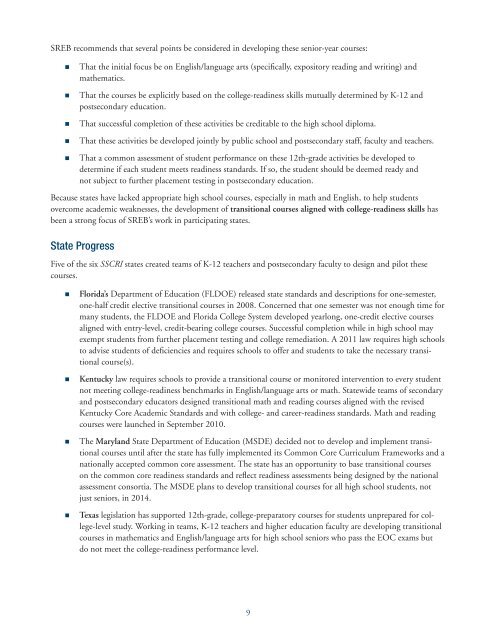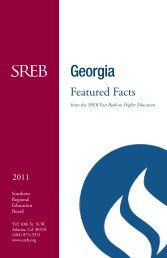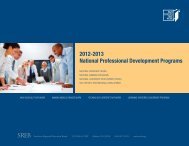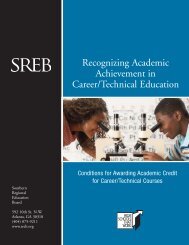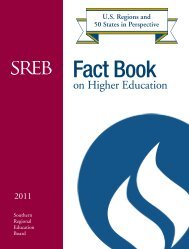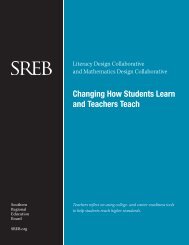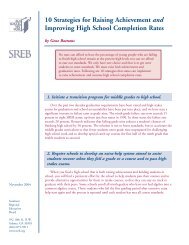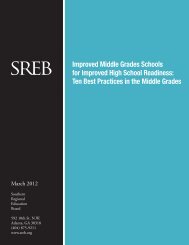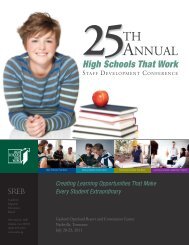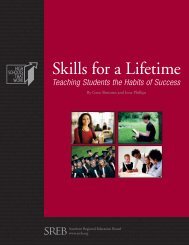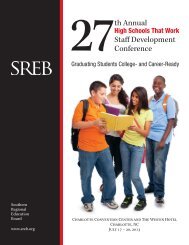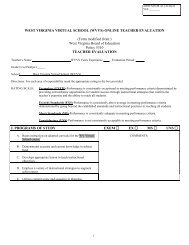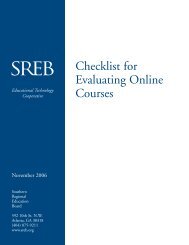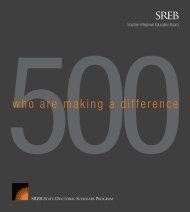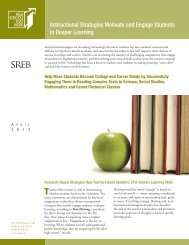Final Progress Reports - Southern Regional Education Board
Final Progress Reports - Southern Regional Education Board
Final Progress Reports - Southern Regional Education Board
Create successful ePaper yourself
Turn your PDF publications into a flip-book with our unique Google optimized e-Paper software.
SREB recommends that several points be considered in developing these senior-year courses:<br />
That the initial focus be on English/language arts (specifically, expository reading and writing) and<br />
mathematics.<br />
That the courses be explicitly based on the college-readiness skills mutually determined by K-12 and<br />
postsecondary education.<br />
That successful completion of these activities be creditable to the high school diploma.<br />
That these activities be developed jointly by public school and postsecondary staff, faculty and teachers.<br />
That a common assessment of student performance on these 12th-grade activities be developed to<br />
determine if each student meets readiness standards. If so, the student should be deemed ready and<br />
not subject to further placement testing in postsecondary education.<br />
Because states have lacked appropriate high school courses, especially in math and English, to help students<br />
overcome academic weaknesses, the development of transitional courses aligned with college-readiness skills has<br />
been a strong focus of SREB’s work in participating states.<br />
State <strong>Progress</strong><br />
Five of the six SSCRI states created teams of K-12 teachers and postsecondary faculty to design and pilot these<br />
courses.<br />
Florida’s Department of <strong>Education</strong> (FLDOE) released state standards and descriptions for one-semester,<br />
one-half credit elective transitional courses in 2008. Concerned that one semester was not enough time for<br />
many students, the FLDOE and Florida College System developed yearlong, one-credit elective courses<br />
aligned with entry-level, credit-bearing college courses. Successful completion while in high school may<br />
exempt students from further placement testing and college remediation. A 2011 law requires high schools<br />
to advise students of deficiencies and requires schools to offer and students to take the necessary transitional<br />
course(s).<br />
Kentucky law requires schools to provide a transitional course or monitored intervention to every student<br />
not meeting college-readiness benchmarks in English/language arts or math. Statewide teams of secondary<br />
and postsecondary educators designed transitional math and reading courses aligned with the revised<br />
Kentucky Core Academic Standards and with college- and career-readiness standards. Math and reading<br />
courses were launched in September 2010.<br />
The Maryland State Department of <strong>Education</strong> (MSDE) decided not to develop and implement transitional<br />
courses until after the state has fully implemented its Common Core Curriculum Frameworks and a<br />
nationally accepted common core assessment. The state has an opportunity to base transitional courses<br />
on the common core readiness standards and reflect readiness assessments being designed by the national<br />
assessment consortia. The MSDE plans to develop transitional courses for all high school students, not<br />
just seniors, in 2014.<br />
Texas legislation has supported 12th-grade, college-preparatory courses for students unprepared for college-level<br />
study. Working in teams, K-12 teachers and higher education faculty are developing transitional<br />
courses in mathematics and English/language arts for high school seniors who pass the EOC exams but<br />
do not meet the college-readiness performance level.<br />
9


